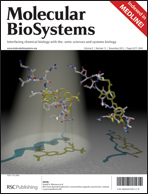Mycobacterial Hsp65 potentially cross-reacts with autoantibodies of diabetes sera and also induces (in vitro) cytokine responses relevant to diabetes mellitus†
Abstract
Diabetes mellitus is a multifactorial disease and its incidence is increasing worldwide. Among the two types of diabetes, type-2 accounts for about 90% of all diabetic cases, whereas type-1 or juvenile diabetes is less prevalent and presents with humoral immune responses against some of the autoantigens. We attempted to test whether the sera of type-1 diabetes patients cross-react with mycobacterial heat shock protein 65 (Hsp65) due to postulated epitope homologies between mycobacterial Hsp65 and an important autoantigen of type-1 diabetes, glutamic acid decarboxylase-65 (GAD65). In our study, we used either recombinant mycobacterial Hsp65 protein or synthetic peptides corresponding to some of the potential epitopes of mycobacterial Hsp65 that are shared with GAD65 or human Hsp60, and a control peptide sourced from mycobacterial Hsp65 which is not shared with GAD65, Hsp60 and other autoantigens of type-1 diabetes. The indirect ELISA results indicated that both type-1 diabetes and type-2 diabetes sera cross-react with conserved mycobacterial Hsp65 peptides and recombinant mycobacterial Hsp65 protein but do not do so with the control peptide. Our results suggest that cross-reactivity of mycobacterial Hsp65 with autoantibodies of diabetes sera could be due to the presence of significantly conserved peptides between mycobacterial Hsp65 and human Hsp60 rather than between mycobacterial Hsp65 and GAD65. The treatment of human peripheral blood mononuclear cells (PBMCs) with recombinant mycobacterial Hsp65 protein or the synthetic peptides resulted in a significant increase in the secretion of cytokines such as IL-1β, IL-8, IL-6, TNF-α and IL-10. Taken together, these findings point towards a dual role for mycobacterial Hsp65: in inducing autoimmunity and in inflammation, the two cardinal features of diabetes mellitus.


 Please wait while we load your content...
Please wait while we load your content...